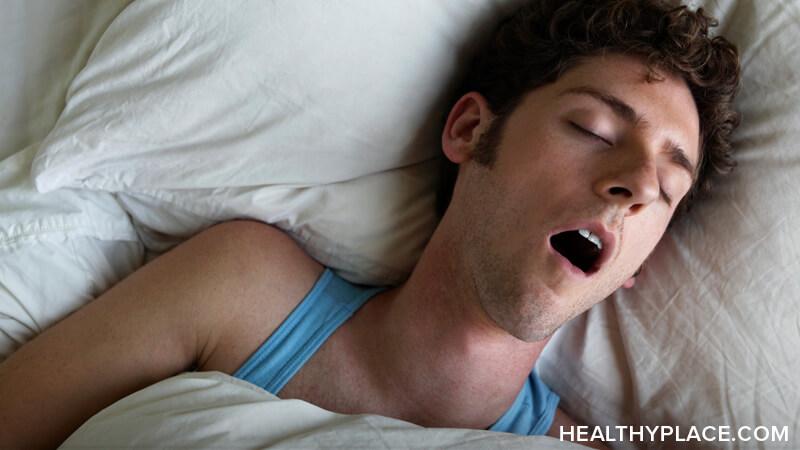Bipolar Affects Sleep, Sleep Affects Bipolar

There is a horrible relationship that people with bipolar disorder live with: bipolar affects sleep and sleep affects bipolar disorder. And neither one of them likes each other. It's like being followed around by a bickering couple that occasionally starts screaming at each other. I downright hate it. So let's take a look at how bipolar affects sleep and how sleep affects bipolar disorder (and you) and what you can do about it.
My Recent Experience with Sleep and Bipolar Affecting Each Other
Recently, I've been experiencing various types of insomnia. I have a hard time getting to sleep and then I ten to wake up early (hello 2:00 a.m.). I suspect this insomnia is a product of my bipolar disorder and increased anxiety. And it's actually kind of odd because I used to experience more hypersomnia (sleeping too much) because of bipolar disorder. But, as I always say, bipolar is a moving target.
In this case, my bipolar has affected my sleep causing insomnia. My sleep has affected my bipolar disorder by destabilizing my mood. My mood is now mixed and even dissociative. It's really, um, weird. I know that's not exactly a technical term, but I feel more crazy than usual. That's being sleep-deprived for you, I suppose.
How Bipolar Disorder Affects Sleep
Of course, science doesn't know exactly why bipolar disorder affects sleep, but we sure the heck know it does. Both insomnia and hypersomnia are symptoms of bipolar disorder.
Sleep is closely intertwined with your circadian rhythm, which is your daily rhythm that tells you when to get hungry, when to sleep, etc. And bipolar disorder has been called a circadian rhythm disorder by some doctors1 because it's clear that this rhythm is majorly disrupted in bipolar disorder. It's even been tracked back to the CLOCK gene, which is often affected in bipolar disorder and can be re-regulated with lithium.
In other words, if you have bipolar disorder and you experience sleep disturbance, well, you're pretty much like the rest of us.
How Sleep Affects Bipolar Disorder
But the really bad news is the way sleep dysregulation affects bipolar disorder because basically, the worse your sleep is, the worse your bipolar disorder is and vice versa.
When you don't sleep well:2
- You decrease your quality of life -- People who sleep poorly experience "significant negative psychosocial, occupational, health, and economic impact."
- You have an increased chance of a bipolar relapse.
- You won't be able to regulate your emotions as well.
- You'll have poorer cognitive function.
- You'll have other negative health impacts on things like weight gain, diet and exercise.
- You have an increased chance of abusing substances (and rates of substance abuse in bipolar disorder are already very high at around 50 percent).
- You have an increased risk of impulsive and risk-taking behavior (part of mania/hypomania).
What to Do About Bipolar Disorder Affecting Sleep
I have noticed the bipolar and sleep relationship for many years which is why I prize my schedule and my sleep. And that is my number one tip with capital letters: get on a sleep schedule. Go to bed at the same time every night no matter what. Get up at the same time in the morning no matter what. If you do this one thing I promise you, you have a 99 percent chance of seeing your sleep and bipolar improve. No, it won't necessarily solve all your problems and additional treatment may still be needed but chances are very good it will help.
Other things you can try to help your sleep-affected bipolar include
- Meditation
- Stretches
- Progressive relaxation exercises
- Cognitive behavioral therapy for insomnia and bipolar (CBT-IB)3
And, of course, if you're having trouble sleeping, you should always be discussing that with your doctor as additional medication or a medication change may be needed. For me, I need a combination of tools to deal with sleep. It's okay if you do too.
Sources
- Phelps, J., "Chapter 3: The Central Role of the Biological Clock." PsychEducation.org, December 2014.
- Harvey, A., "Sleep Disturbance in Bipolar Disorder Across the Lifespan." Clinical Psychology: Science and Practice, June 2009.
- Phelps, J., "CBT-IB: A Sleep-Focused Therapy." PsychEducation.org, February 2019.
APA Reference
Tracy, N.
(2020, June 17). Bipolar Affects Sleep, Sleep Affects Bipolar, HealthyPlace. Retrieved
on 2026, March 4 from https://www.healthyplace.com/blogs/breakingbipolar/2020/6/bipolar-affects-sleep-sleep-affects-bipolar
Author: Natasha Tracy
I am very sensitive to the seasonal changes which affect my circadian rhythm and in turn my bipolar. If I am not careful I can become quite manic during the summer. In stark contrast to the winter months where I struggle to get out of bed. Even after a pot on strong coffee!
~ I take an 'over the counter' Benedryl and 2 Magnesium Bisglycinate Tablets every evening; I finally have a guality sleep every night after suffering with insomnia for untold years; without sleeping pills. Insomnia is a terrible thing to deal with. It effects every area of ones life ~
Hi Margaret,
Thank you for leaving a comment. You're right, it does affect every area of one's life.
Understand, though, Benedryl is not without risk. Its constant use has been linked to dementia. Please read this: https://www.medicalnewstoday.com/articles/288546
I suggest you talk to your doctor about that if that is of concern to you.
- Natasha Tracy
